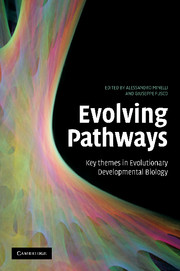Book contents
- Frontmatter
- Contents
- Contributors
- Preface
- Introduction: Pathways of change
- Part I Thinking about evolution by taking development on board
- 1 Evo-devo as a discipline
- 2 Making evolutionary predictions about the structure of development and morphology: beyond the neo-Darwinian and constraints paradigms
- 3 Conflicting hypotheses on the nature of mega-evolution
- 4 Prospects of evo-devo for linking pattern and process in the evolution of morphospace
- 5 The molecular biology underlying developmental evolution
- 6 Evo-devo's identity: from model organisms to developmental types
- Part II Evo-devo: methods and materials
- Part III Evolving diversity
- Part IV Evolving body features
- Index
- References
1 - Evo-devo as a discipline
Published online by Cambridge University Press: 08 August 2009
- Frontmatter
- Contents
- Contributors
- Preface
- Introduction: Pathways of change
- Part I Thinking about evolution by taking development on board
- 1 Evo-devo as a discipline
- 2 Making evolutionary predictions about the structure of development and morphology: beyond the neo-Darwinian and constraints paradigms
- 3 Conflicting hypotheses on the nature of mega-evolution
- 4 Prospects of evo-devo for linking pattern and process in the evolution of morphospace
- 5 The molecular biology underlying developmental evolution
- 6 Evo-devo's identity: from model organisms to developmental types
- Part II Evo-devo: methods and materials
- Part III Evolving diversity
- Part IV Evolving body features
- Index
- References
Summary
Since its inception in the early 1980s, evo-devo has evolved into a mature discipline. This is manifest in the naming of research groups, scientific journals and books, professional meetings and societies. Despite such formal attributes of a scientific discipline it is often unclear what constitutes its conceptual distinctiveness. Does evo-devo have its own set of specific questions and research methods? Does it solve biological problems that cannot be solved by other approaches? And does it represent a significant change in the theoretical understanding of development and evolution? That is, in which way do the goals, the empirical programs and the theories of evo-devo research differ from those of neighbouring disciplines such as developmental biology or evolutionary biology? The present chapter provides a concise overview of the current status of evo-devo as a discipline. This requires a short reflection on its history.
CONCEPTUAL FOUNDATIONS
The parallels between embryonic stages and the ‘scale of beings’ had already been contemplated in pre-Darwinian times, and the foundation of a scientific theory of evolution was significantly influenced by embryological arguments. Darwin called embryology ‘by far the strongest single class of facts in favour of a change of form’, and his first sketches of a phylogenetic tree seem to have been inspired by tree-like renderings of embryological differences between species (Richards 1992). Much of the early work in evolutionary biology focused on the uses of embryonic characters for taxonomical purposes.
Information
- Type
- Chapter
- Information
- Evolving PathwaysKey Themes in Evolutionary Developmental Biology, pp. 5 - 30Publisher: Cambridge University PressPrint publication year: 2008
References
Accessibility standard: Unknown
Why this information is here
This section outlines the accessibility features of this content - including support for screen readers, full keyboard navigation and high-contrast display options. This may not be relevant for you.Accessibility Information
- 26
- Cited by
